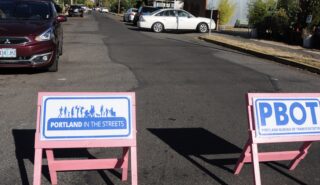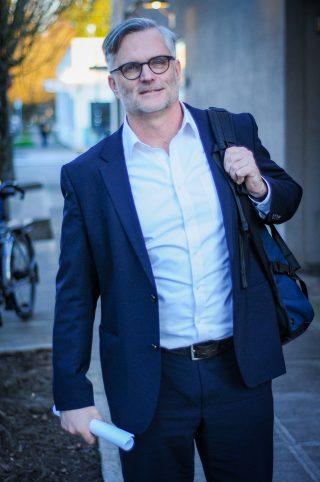
As the debate rages about whether or not Portland should add space and safety to streets for vulnerable people, a former mayor thinks it’s time to move forward.
Sam Adams was on Portland City Council from 2005 to 2012 — first as a commissioner, then as mayor. Throughout his tenure he was in charge of the Portland Bureau of Transportation and the agency was one of this top priorities. Adams now finds himself on the outside looking in as he eyes the council seat occupied by the current PBOT Commissioner Chloe Eudaly.
“I think it’s a mistake to say, ‘No, not now.'”
— Sam Adams, city council candidate
As we reported Friday, Commissioner Eudaly still doesn’t think it’s the right time to take any steps toward adapting to pandemic-influenced behaviors like a sharp decrease in driving and an uptick in bicycling and walking. According to data from the Oregon Department of Transportation, the current “stay home” order and virus fears have led to a 38% reduction in driving traffic statewide.
Advertisement

(Photo: J. Maus/BikePortland)
Asked what he thinks of the commissioner’s current position, Adams said he’s got an idea that takes Eudaly’s concerns into account. “I suggest we do six pilots spaced around the city, using the block party permitting process, and based on people applying to initiate them.” Adams would try it for two weeks, then add more pilots, tweak the approach, or abandon it if it doesn’t work out.
PBOT’s block party permit program has been around for many years and was streamlined for easier implementation in 2017 when city council passed the Livable Streets Strategy.
Adams said PBOT could vet permit applications and add modifications to the program. “I think we’re all going to be required to wear masks, so we might as well be required,” he said. PBOT currently only allows two types of barricades to limit through drivers during block parties, but Adams said he’d allow homemade barricades for the six pilots. “It’s really about leaning into the trust of Portlanders. It would be self-policing and complaint driven.”
One of the reasons Commissioner Eudaly says she hasn’t announced any major street reconfigurations as part of a Covid-19 response is because city maintenance crews are only at half-capacity. Adams said he’s “sympathetic” to that issue, but he doesn’t think it’s a deal-breaker. “I think it’s a mistake to say, ‘No, not now.'”
Advertisement
“Parks are getting crowded and in neighborhoods that aren’t close to parks, this would be a way for them to have outdoor space.”
“I think we still have the resources,” he added. “And with the benefits to human sanity and health, we can handle pilots and learn a lot more and go from there. It doesn’t have to be all or nothing. Let’s prove our collective selves right or wrong.” Since PBOT would have to vet each applicant before approval, Adams said they could speed up the process by doing it virtually via Zoom.
Any proposal must be equitable and fair to Portlanders of color and lower income levels. Adams said he’d make sure temporary street access changes would be spread around the city. He would rely on PBOT staff to make the choices and make it clear, “They can’t just be in our upscale neighborhoods.” Adams also said he’d order PBOT to leverage their large database of transportation equity nonprofits and volunteers and have them select street locations. (In related news, today the mayor of Washington D.C. announced a program where local neighborhood and business associations submit locations to implement sidewalk extensions to give people more space to walk.)
Adams doesn’t think people congregating on certain streets will be a problem. And if it is, “We find a way to deal with that, or we can stop the pilots.” “I think that concern needs to be balanced with what I’m seeing, which is the parks are getting crowded and in neighborhoods that aren’t close to parks, this would be a way for them to have outdoor space.”
The city of Oakland, California has started to restrict driving on a network of 74 miles of streets. Adams said he likes that plan but he’s trying to come up with a politically palatable solution given the tepid response thus far from Portland city hall. “If the transportation leadership had a different outlook on this,” he said. “I think that [Oakland-style approach] would be more realistic.”
— Jonathan Maus: (503) 706-8804, @jonathan_maus on Twitter and jonathan@bikeportland.org
— Get our headlines delivered to your inbox.
— Support this independent community media outlet with a one-time contribution or monthly subscription.


